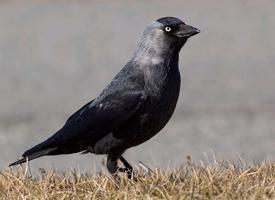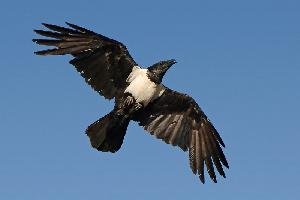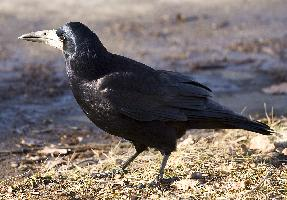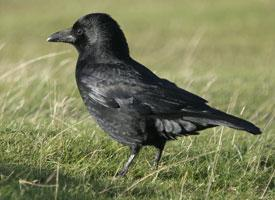
Poids et mesures
| Longueur | de 45 à 49 cm |
|---|---|
| Poids | de 600 à 700 g |
| Envergure des ailes | de 93 à 104 cm |
Description de l'animal
The Carrion Crow (Corvus corone) is a fascinating bird species belonging to the genus Corvus within the Corvidae family, which is renowned for its intelligence and adaptability. This bird is a common sight across Europe and the eastern Palearctic region, where it occupies a variety of habitats including farmlands, suburban areas, and dense forests. The Carrion Crow is a versatile feeder, thriving on a diet that includes insects, small mammals, carrion, seeds, and even human refuse, showcasing its remarkable adaptability to different environments.Physically, the Carrion Crow is a robust bird, characterized by its all-black plumage that gleams with a bluish or greenish sheen in sunlight. It typically measures about 48 to 52 centimeters in length, making it a medium-sized crow. Its strong, stout beak and legs are also black, contributing to its overall dark appearance. One of the most distinguishing features of the Carrion Crow is its intense, intelligent gaze, accentuated by bright, piercing eyes that are almost hypnotic in nature.
The Carrion Crow is known for its impressive cognitive abilities. Studies have shown that these birds can use tools, solve complex problems, and even recognize human faces, which is a testament to their intelligence. Their social behavior is also noteworthy; while they are often seen alone or in pairs, they can form larger groups when foraging or roosting. The vocalizations of Carrion Crows are varied and complex, including a distinctive "caw" sound that is recognizable to many people. These vocal skills are not just for communication among crows; they can also mimic the sounds of other animals or even human-made noises.
Breeding behavior of the Carrion Crow is quite intricate. They are monogamous birds, often forming pairs that last many years, if not for life. Nests are typically built high in trees and are constructed from twigs and lined with softer materials like hair or moss. The female lays between 3 to 6 eggs, which she incubates for about 18 days until they hatch. Both parents are involved in feeding and protecting the nestlings, which fledge approximately one month after hatching.
Despite their adaptability and widespread presence, Carrion Crows face threats from habitat loss, pollution, and persecution. In some areas, they are considered pests and are targeted by farmers and gamekeepers. However, they are currently listed as Least Concern by the International Union for Conservation of Nature (IUCN), indicating that they are not immediately threatened with extinction.
In folklore and mythology, the Carrion Crow has often been associated with war, death, and the supernatural, likely due to its scavenging habits and its all-black plumage. However, this bird's intelligence, adaptability, and complex social structures reveal a creature that is much more than the sum of its cultural representations, making it a subject of ongoing fascination and study in the scientific community.
Carte de répartition
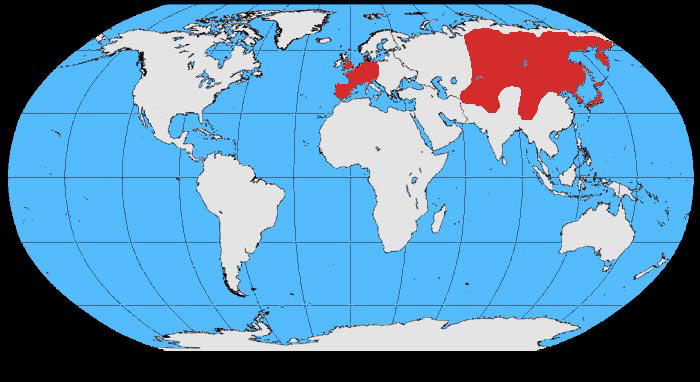
Animaux similaires
Nouvelles photos d'animaux
Top 10 des animaux
- Dolphin gull (Leucophaeus scoresbii)
- Diana monkey (Cercopithecus diana)
- Moustached guenon (Cercopithecus cephus)
- Galápagos tortoise (Geochelone nigra complex)
- Japanese macaque (Macaca fuscata)
- Stone loach (Barbatula barbatula)
- Russian tortoise (Testudo horsfieldii)
- Greek tortoise (Testudo graeca)
- Common flying dragon (Draco volans)
- Vendace (Coregonus albula)
